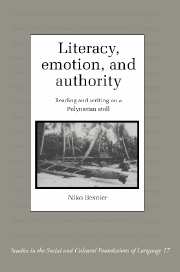Book contents
- Frontmatter
- Contents
- List of illustrations and tables
- Acknowledgments
- Transcription conventions and orthography
- 1 Introduction
- 2 The ethnographic context
- 3 The domains of reading and writing
- 4 Letter writing and reading
- 5 Letters, economics, and emotionality
- 6 Between literacy and orality: the sermon
- 7 Literacy, truth, and authority
- 8 Conclusion
- Notes
- References
- Index of Tuvaluan words
- General index
3 - The domains of reading and writing
Published online by Cambridge University Press: 14 August 2009
- Frontmatter
- Contents
- List of illustrations and tables
- Acknowledgments
- Transcription conventions and orthography
- 1 Introduction
- 2 The ethnographic context
- 3 The domains of reading and writing
- 4 Letter writing and reading
- 5 Letters, economics, and emotionality
- 6 Between literacy and orality: the sermon
- 7 Literacy, truth, and authority
- 8 Conclusion
- Notes
- References
- Index of Tuvaluan words
- General index
Summary
Continuing in the historical vein of the previous chapter, I now turn to what can be termed loosely the “domains” of literacy on Nukulaelae. I first identify the languages with which literacy is associated. I then discuss the social history of schooling since the 1860s; while the rest of this book is primarily concerned with literacy outside of schools, a brief description of school literacy is nevertheless relevant. I then attend to the historical context of literacy, insofar as it can be distinguished from the historical evolution of schooling and religious conversion. The last section is an overview of the range of social settings in which reading and writing take place on the atoll. In this overview, I pay particular attention to “non-textual” literacy practices, i.e., the production and consumption of lists, slogans, notices, and other written materials of lesser substance and importance than letters, to which I devote Chapters 4 and 5, and sermons, the topic of Chapters 6 and 7.
Languages
Nukulaelae Islanders speak, write, and read a dialect of Tuvaluan. Other dialects of this language are spoken on seven of the eight other islands of the Tuvalu group (the inhabitant of Nui speak a dialect of Gilbertese, a Micronesian language). Its closest relatives are members of the Samoic-Outlier subgroup of Polynesian, which includes Samoan, Tokelauan, Futunan, Uvean (Wallisian), and the languages of all Polynesian Outlier societies enclaved in Melanesia and Micronesia (Pawley 1966, 1967).
- Type
- Chapter
- Information
- Literacy, Emotion and AuthorityReading and Writing on a Polynesian Atoll, pp. 52 - 71Publisher: Cambridge University PressPrint publication year: 1995



